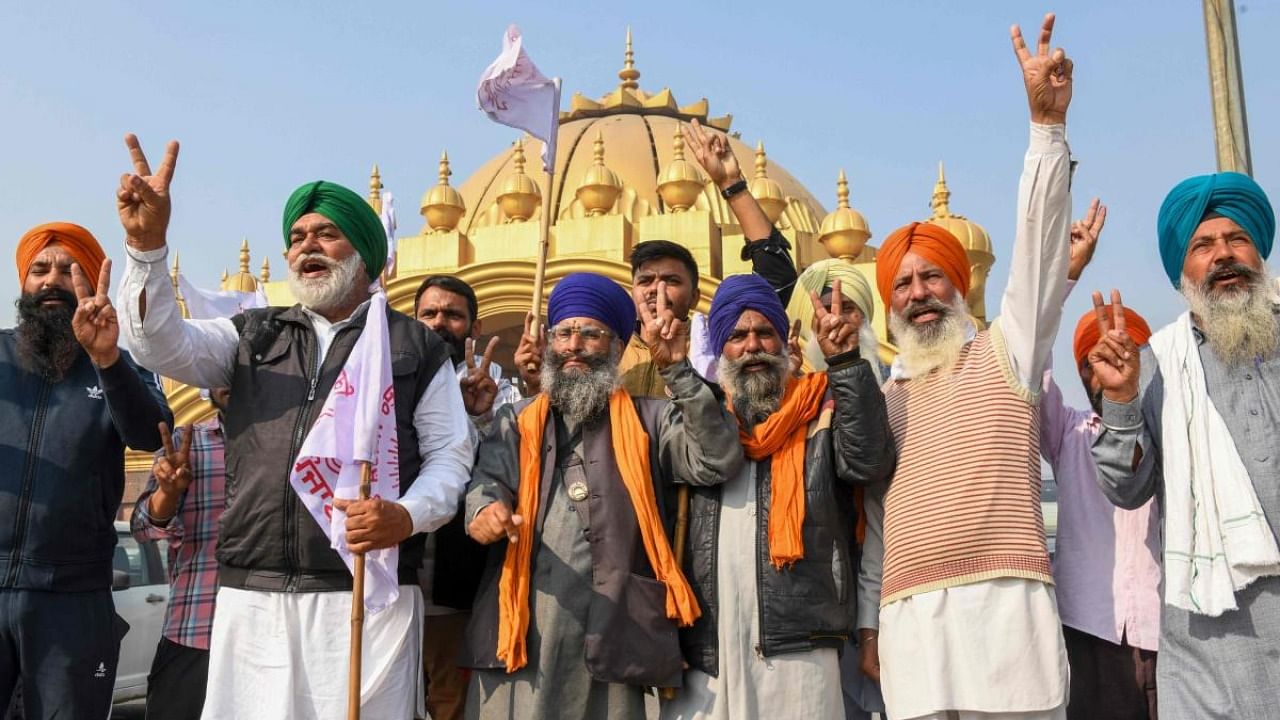
Balls of smoke spiral up and hang low under the flyover at Ghazipur on the Uttar Pradesh-Delhi border. The smoke is from long-stemmed hookahs that Jat farmers gathered around share. The smell of roasting tobacco hangs thick in the windless afternoon. And then the youth come running with laddoos.
“Khaiye, khaiye,” eat, eat, they shout as they run with boxes full of the sweets from cluster to cluster. “Yeh Sardaron ka laddoo hain, Modiji ka nahin”. These are laddoos from Sardars, not from (PM) Modi.
About three hours after the Prime Minister’s announcement that the farm laws will be repealed in a Parliament session that begins before the end of this month, the mood in Ghazipur was not quite celebratory. Above the flyover that connects Delhi with Western Uttar Pradesh, there are more groups of farmers and activists, a vocal lot, who are not in the mood to relent.
“We have paid a huge price, and we are not there yet. He will have to guarantee MSP (minimum support price for crop), and he will have to take back the charges against our people,” shouts Surendra Pal Singh. He is from Horthla village in UP’s Bulandshahr district and is wearing a cap of the Jai Kisan Andolan, one of the constituents of the Samyukta Kisan Morcha that is leading the movement. He says he is with Rakesh Tikait.
Rakesh Tikait’s Bharatiya Kisan Union supporters have been gathered here for nearly a year. They were not initially with the Samyukta Kisan Morcha but joined later. Most of the protesters here are from Western Uttar Pradesh and the Terai (plains) of Uttarakhand. They are also here from Lakhimpur Kheri, where a central minister’s son is accused of driving his off-roader into farmers.
Delhi is surrounded by Haryana to the south, west and north, and only in the east does it share a border with UP.
Also Read | Explained | How a law is repealed
The deep sense of hurt among the farmers in Ghazipur is not of quiet grief but palpable anger. They feel that the entire establishment – and they target not only the Modi sarkar but also most mainstream media platforms that are based out of Noida – had campaigned against them.
Surendra Pal Singh has composed 16 poems on the farmers’ protests, one of which advises the media to correct its ways.
I go from group to group here this afternoon, both on and under the flyover, engage them in conversation and ask each if the announcement that the farm laws will be repealed will impact the Assembly elections in UP. All the people I spoke to said that the Modi-Yogi combine would lose, and it is the fear of losing that forced this morning’s announcement.
Western Uttar Pradesh, where most of these farmers have come from, is a deeply regressive society. The mahapanchayats that have endorsed the farmers’ movement have also in the past enforced casteist policies. For instance, the mahasabhas did not speak out against the rape and murder and cremation-by-night of the teenager in Hathras last year.
“Modi has only admitted that we are farmers and not Khalistanis or terrorists after his ministers called us so many names,” says the grey-bearded Balwant Singh from a village near Lakhimpur Kheri. He says he has a PhD in entomology from the University of Hyderabad earned in 1966.
“What kind of justice is it that a minister’s son runs over our people and the minister is still continuing in office?”
In the encampment at Ghazipur this afternoon, many of the stalls are shut. In one that is open, Jaishankar Singh, who has reached here only yesterday from Uttarakhand, is stirring a cauldron of milk on an oven.
“Kheer ban rahi hai”, I am making sweet rice.
(The writer is a journalist)
Disclaimer: The views expressed above are the author's own. They do not necessarily reflect the views of DH.